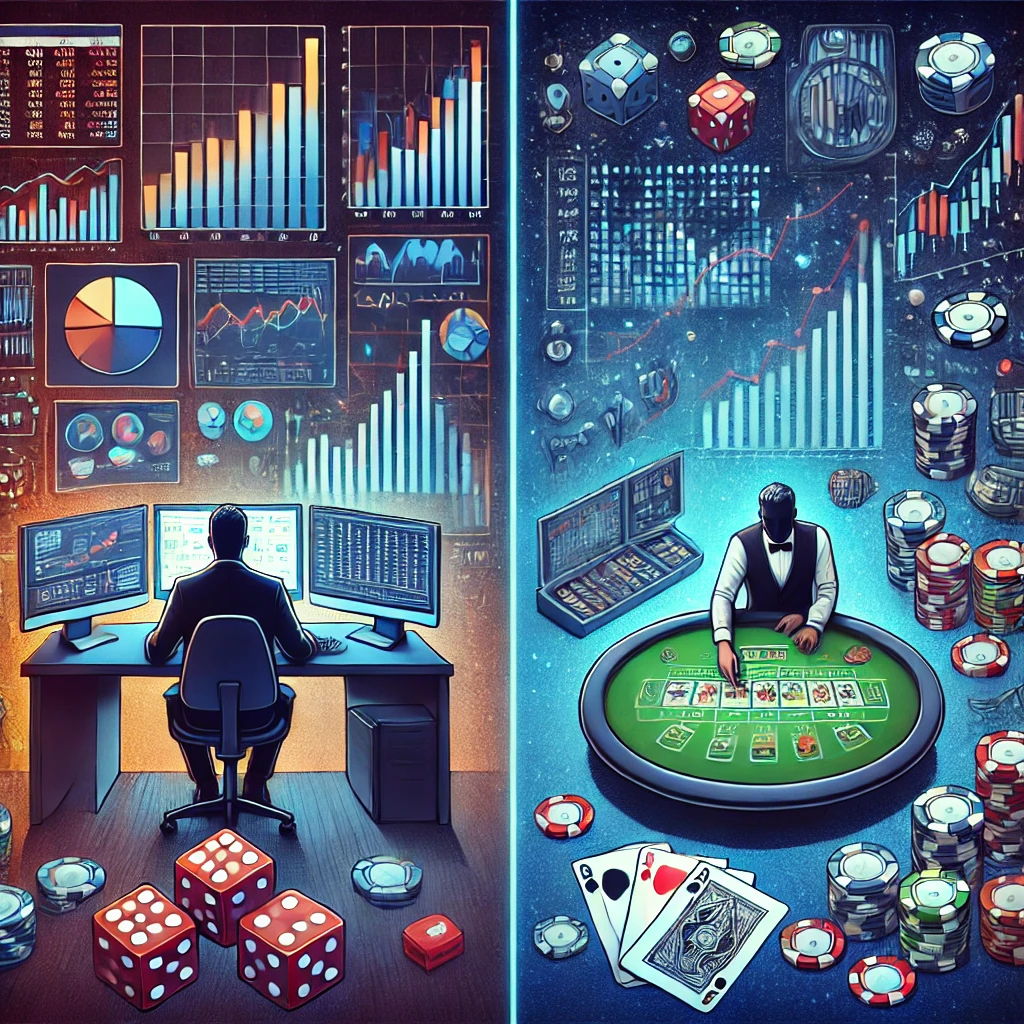Trading in financial markets is often misunderstood and unfairly compared to gambling. While both involve risk and uncertainty, equating trading to gambling oversimplifies the skill, strategy, and discipline required for successful trading. This blog will delve into the differences between trading and gambling, debunk myths, and highlight why trading is a legitimate activity rooted in informed decision-making.
What Is Trading?
Trading refers to the buying and selling of financial instruments like stocks, commodities, currencies, and derivatives with the goal of making a profit. Traders analyze market trends, company fundamentals, economic indicators, and use technical tools to make calculated decisions. Successful trading requires knowledge, strategy, discipline, and a strong understanding of risk management.
What Is Gambling?
Gambling, on the other hand, involves staking money or something of value on an event with an uncertain outcome, typically driven by chance. Whether it’s a casino game, sports betting, or lottery, gambling primarily relies on luck, with little room for skill or strategy to influence the result. The odds in gambling are often stacked against participants, ensuring that the house or organizer profits over time.
Key Differences Between Trading and Gambling
1. Skill vs. Luck
- Trading: Success in trading depends heavily on skill. Traders use analysis, research, and strategies to identify profitable opportunities. Over time, experience and continuous learning improve their ability to navigate the markets.
- Gambling: While some games, like poker, involve a degree of skill, most forms of gambling, such as roulette or slot machines, are purely luck-based. Participants have little to no control over the outcome.
2. Risk Management
- Trading: Risk management is a cornerstone of trading. Traders set stop-loss orders, diversify their portfolios, and allocate capital wisely to minimize potential losses. Successful traders never risk more than they can afford to lose.
- Gambling: In gambling, risk management is minimal or nonexistent. Players often bet everything in a single round, with no systematic way to control losses or recover from setbacks.
3. Outcome Probability
- Trading: While the outcome of any single trade is uncertain, traders rely on probabilities based on historical data, market trends, and analysis. This gives them an edge over the market in the long run.
- Gambling: The probabilities in gambling are typically fixed and designed to favor the house. For instance, the odds in a roulette game ensure the casino always has a statistical advantage.
4. Time Horizon
- Trading: Trading involves a wide range of time horizons, from day trading to long-term investing. Traders can adapt their strategies based on market conditions and personal goals.
- Gambling: Gambling outcomes are immediate. Once the game ends, the result is final, leaving no room for adjustment or recovery.
5. Value Creation
- Trading: Trading contributes to the financial ecosystem by providing liquidity and helping companies raise capital. Investors and traders play a vital role in economic growth.
- Gambling: Gambling does not create value. It is a zero-sum game where one person’s gain is another’s loss.
Common Misconceptions About Trading
1. “Trading Is Just Guesswork”
Many believe trading is about guessing which stock or asset will go up. In reality, traders conduct thorough research, use technical indicators, and analyze market conditions to make informed decisions.
2. “Day Trading Is No Different From Gambling”
Day trading requires quick decision-making, but it is not the same as gambling. Day traders use strategies like scalping, momentum trading, and risk management techniques to achieve consistent results over time.
3. “All Traders Lose Money”
While many novice traders lose money due to lack of experience or poor strategies, professional traders with the right approach can generate consistent profits. The key lies in education, discipline, and risk management.
Why Trading Is a Legitimate Activity
1. Economic Contribution
Trading plays a crucial role in global economies by facilitating price discovery, improving market efficiency, and providing liquidity. It helps companies access capital to grow and innovate.
2. Knowledge and Strategy
Successful trading requires a deep understanding of markets, industries, and global economic factors. Traders use strategies tailored to their goals, risk tolerance, and market conditions.
3. Regulated Environment
Financial markets are heavily regulated to ensure transparency, fairness, and investor protection. Regulatory bodies like the SEC in the United States oversee trading activities to prevent fraud and market manipulation.
4. Educational Resources
The availability of educational resources, online courses, and trading platforms empowers individuals to learn and practice trading effectively. Unlike gambling, where luck is the primary factor, trading rewards those who invest in their knowledge and skills.
Tips for Aspiring Traders
If you’re interested in trading but want to avoid the pitfalls of treating it like gambling, follow these tips:
1. Educate Yourself
Learn the basics of trading, market analysis, and risk management. Use resources like books, online courses, and webinars to build a strong foundation.
2. Develop a Trading Plan
Create a detailed plan outlining your goals, risk tolerance, and strategies. Stick to your plan and avoid emotional decisions.
3. Practice with a Demo Account
Most trading platforms offer demo accounts where you can practice without risking real money. Use this opportunity to refine your strategies and gain confidence.
4. Manage Risk
Never risk more than you can afford to lose. Use stop-loss orders and position sizing to protect your capital.
5. Keep Emotions in Check
Emotional trading often leads to poor decisions. Stay disciplined and avoid impulsive trades based on fear or greed.
6. Continuously Learn
Markets are dynamic, and staying updated on economic trends, news, and new trading strategies is essential for long-term success.
Conclusion
Trading is not gambling. While both involve risk, trading is a disciplined, skill-based activity that rewards knowledge, strategy, and risk management. By understanding the key differences and approaching trading with the right mindset, you can avoid the pitfalls of gambling and build a sustainable path to financial success. Whether you’re a novice or an experienced trader, continuous learning and discipline are your best allies in navigating the financial markets.
By debunking the myth that trading is akin to gambling, we can encourage more individuals to explore trading responsibly and recognize its value as a legitimate and rewarding endeavor. Start your journey with a commitment to learning, and you’ll find that trading is far more than a roll of the dice.
Discover more from Beauty Cosmetics
Subscribe to get the latest posts sent to your email.

